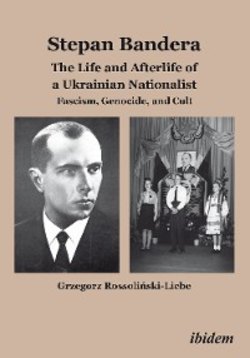Читать книгу Stepan Bandera: The Life and Afterlife of a Ukrainian Fascist - Grzegorz Rossoliński-Liebe - Страница 15
Memory, Identity, Symbol, and Denial
ОглавлениеThe last theoretical notion that needs to be shortly introduced—before we move to the empirical part of this book—is memory. Bandera’s image in the collective memories of different communities has varied from the very beginning. Bandera was remembered in an idealized and heroic way by people who participated in his cult and who believed in his myth. The way that Polish, Jewish, and other survivors of the OUN and UPA terror remembered Bandera was very different from the way his worshipers among the Ukrainian diaspora did. Soviet propaganda shaped a very negative and offensive way of remembering and presenting Bandera and the OUN-UPA. After the dissolution of the Soviet Union, the memory of Bandera has divided post-Soviet Ukraine.
In order to analyze the different memories of Bandera, we must differentiate between at least three concepts: individual memory, collective memory, and the politics of memory. A number of people knew Bandera and thus possessed some kind of personal memory of him. The publication and dissemination of their memories allowed other individuals, who did not know Bandera in person, to familiarize themselves with his life and to develop some emotional bond with him, if they had not already done so through the cult and myth. This obviously influenced the collective memory of a community who shared a similar identity and a similar realm of experience. Both kinds of memories were influenced by the politics of memory, which defined how to conduct official commemorations, or how a biography, film, or exhibition should present the Providnyk, in order to meet the political expectations of a community, a society, or a state.[72]
The investigation of memory—like the investigation of the cult and myth—should not, however, obstruct the investigation of the “real” history of Ukrainian nationalism and the “real” personality of Bandera. Neglecting actual history or trying to understand history through the framework of memory is a dangerous tendency in contemporary historiography which, especially in fields like the Second World War or the Holocaust, opens doors to various radical right activists and other abusers of history. To avoid such problems, we should examine a memory also in the light of Holocaust denial and Holocaust obfuscation and pay particular attention to the question whether those far-right groups and nationalist communities that commemorated Bandera, the OUN, and the UPA recalled, ignored, or deliberately denied the Ukrainian contribution to the Holocaust, and other atrocities committed by the Ukrainian nationalists.[73] With this in mind, we should examine the “archives of silence,” which are the result of collective ignorance of history. These archives are full of suppressed and forgotten—but very important—elements of national history, particularly history related to ethnic and political violence, and other elements that do not correspond with a patriotic interpretation of history.[74] “‘I did that,’ says my memory. I couldn’t have done that—says my pride, and stands its ground. Finally, memory gives in,” remarked Friedrich Nietzsche in 1886.[75]
